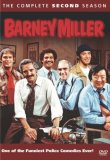| Reviews & Columns |
|
Reviews DVD TV on DVD Blu-ray 4K UHD International DVDs In Theaters Reviews by Studio Video Games Features Collector Series DVDs Easter Egg Database Interviews DVD Talk Radio Feature Articles Columns Anime Talk DVD Savant Horror DVDs The M.O.D. Squad Art House HD Talk Silent DVD
|
DVD Talk Forum |
|
|
| Resources |
|
DVD Price Search Customer Service #'s RCE Info Links |
|
Columns
|
|
|
Barney Miller: The Complete Second Season
Sony has released Barney Miller: The Complete Second Season, a three-disc, 22-episode collection of the 1975-1976 sophomore season of this beloved 1970s police comedy. A favorite of fans who appreciated smart, humorous writing, along with a second-to-none stellar ensemble cast, Barney Miller's warm, hilarious, funky groove plays just as well today as it did over thirty years ago.
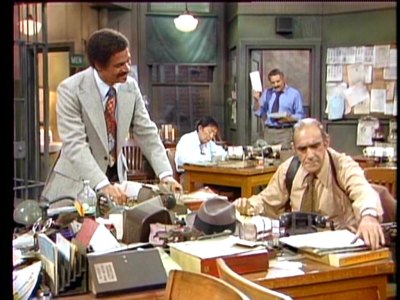
Barney Miller: The Complete Second Season is actually the first full season of the series. Debuting as a mid-season replacement in January, 1975, for The Odd Couple, which had unfortunately been shuffled from its regular Friday night spot to Thursdays at 8:00pm, Barney Miller had originated as a failed pilot called The Life and Times of Barney Miller, which had been included in a one-off 1974 summer anthology compilation of failed pilots called Just for Laughs. Positive response from the ABC Network attracted a 13-episode pick-up for mid-season 1975, with a further order for a full season for the 1975-1976 television year.
This particular season of Barney Miller sees the series finally coming into its own after working out the various kinks of the first half-season. All of the action now focuses squarely on the disgusting, crummy squad room of Greenwich Village's 12th Precinct. Barbara Barrie, who plays Barney's wife Liz, is only seen a few isolated times here (she would eventually be written out of the show, save for some later season cameos, by the end of the year), while his kids Rachel and David are nowhere to be found. "Family" for Barney Miller is now strictly limited to Barney's co-workers at the 12th, creating an enclosed, "bunker mentality," pressure-cooker form of comedy that worked well with the show's stated themes.
Even though Barney Miller was filmed in sunny Los Angeles, it has an admirably grungy New York feel, both to its writing and its theatrical performances. "New York City" is as much a character in Barney Miller as Detectives Fish and Wojohowicz. Created by New Yorkers Danny Arnold and Theodore J. Flicker, Barney Miller's main line of comedic tension came from the daily trials and tribulations that came with being a police officer in the single most screwed-up city in America. Trying to keep their sanity, the cops of the 12th had to endure the daily humiliations and outrages of keeping a lid on their little corner of this barely suppressed jungle known as "New York City." Everything from mad bombers, arsonists, police snipers, forgers, bogus priests, pickpockets, car thieves, corrupt cops, pregnant women, to the Bicentennial, plague the men of the 12th, with working conditions reduced to Third World squalor.
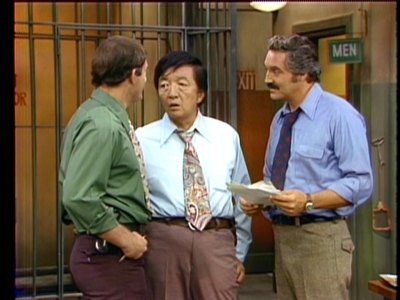
The officers don't even get a respite from the harsh realities of New York at their own work place. Equally memorable in the series is the character of the actual 12th Precinct building (always represented by only one set: the squad room), which stands in nicely for the societal decay and rot that permeates the city (further amplified by the various hilarious/horrifying aging jokes at the expense of Detective Fish). Condemned in 1934 (according to Fish), the 12th provides a constant source of humor in its various dilapidations (a roof that leaks, a bathroom from Hell, no air conditioning, windows that don't open, rats, crumbling walls, rotten floors). If you grew up or were an adult in 1975, you remember that it was an extremely stressful, tumultuous time for the country (when the hell isn't it?). Inflation was out of control, the country had just suffered through Johnson's Vietnam and Nixon's shameful Watergate, and the oncoming malaise and political humiliations of the Carter administration were just around the corner. It was a popular time to seriously discuss if America was going to "make it" through the decade. And New York City, for perhaps the last time standing in as "America's City," with its crumbling infrastructure, overcrowding, and rising crime rate, was a convenient symbol of what was "wrong" with America (and what could very funny about it, too, if viewed through a laid-back TV series like Barney Miller). With the constant pressures of a city and country seeming going insane, it's no wonder the men of the 12th see each other as survivors who have to depend on each other's humor to get through the day.
And of course, in such an extreme environment, a "comedy of opposition" naturally develops. The typical Barney Miller episode has the men entering the squad room in the morning, perhaps commenting on the latest outrage occurring in the city, before a bust brings in several whacko criminals who give their skewed outlook on life, which the men of the 12th laugh at - and often, too, find a twisted logic within their mad ramblings. Frequently, the most marginalized characters on earth - perhaps a destitute bum, a hooker, or a totally anonymous "nobody" - would surprise Barney and the rest of the squad room with a slant on life and what it takes to survive it, that was totally out of keeping with their expected stereotypes. That was the beauty of Barney Miller, the heart of the series. The comedy and the one-liners were frequently hilarious (many of them of Neil Simon/Woody Allen-like quality), but it was this understanding, this empathy with the downtrodden, the forgotten, and the frequent message of tolerance and acceptance, that made the series ultimately such a warm experience. No better example of Barney Miller's broadminded, patient outlook is the frequent outcome of the 12th's arrests: after taking into account what happened (and how jail probably won't help), and after victim and criminal come to an understanding over their backgrounds and motives, Barney and the men usually counsel dropping the whole matter. It's unusual when somebody actually goes to jail at the 12th.
Furthering the "New York" atmosphere of Barney Miller is the deliberately theatrical feel of the series, both in how it's shot and acted. Usually limited to the one set, Barney Miller feels like a weekly mini playlette, with the ensemble cast trading barbs and one-liners with a back-and-forth rhythm that's more off-Broadway than Studio City, U.S.A. Of course the cast, many of them theatre trained, greatly enhance this feeling. Hal Linden (a perfect series anchor), Abe Vigoda (pitch-perfect), Jack Soo (one of the most brilliant deadpan jokesters ever), and James Gregory (hilarious as the morbid Inspector Lugar) had all been on Broadway, with the rest (Ron Glass as Harris, still finding the tone of his character, and Sierra, a loss to the series when he leaves after this season), receiving theatre training earlier in their careers, as well. These are actors who know how to not only "create" a character, but how to integrate it within a larger fabric, creating a true ensemble effort. Anyone familiar with Barney Miller remembers that the quality of acting (including a roster of character actors as the criminals and victims that was truly astounding) was miles above the average popular sitcom at the time. That's probably why Barney Miller still generates big laughs today, despite some of the dated topical references buried in the episodes (and an insistent laugh track that overdoes "the applause" cue most egregiously). This is character-driven comedy, with the essential truths brought out among the laughs, timeless.
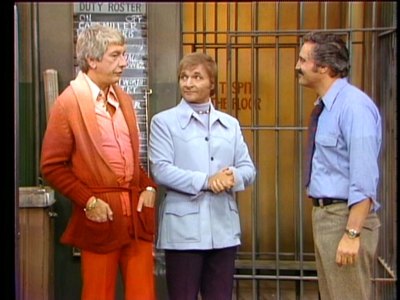
Here are the 22, one-half hour episodes of the three-disc box set Barney Miller: The Complete Second Season, as described on their slimcases:
DISC ONE:
Doomsday
A disgruntled citizen, wired with dynamite, takes the precinct hostage. Wojo arrests a con man posing as a priest.
Social Worker
To Barney's dismay, Liz enters the workforce as a social worker, and an expert forger captivates Harris.
The Layoff
The 12 Precinct finds itself shorthanded as Chano, Harris and Wojo are laid off. A sullen stockbroker turns to purse snatching.
Ambush
Yemana takes a non-fatal bullet, and Barney receives a job offer.
Heat Wave
Wojo goes undercover to bust a park rapist. A wife claims spousal abuse but can't decide whether to press charges.
Arsonist
Chano busts a man for assaulting a vending machine. The detectives are on the lookout for an arsonist.
Grand Hotel
Wojo and Wentworth play house to catch a thief who's cleaning up in a ritzy hotel.
Discovery
Marty alleges that one of Barney's men is attacking the gay community. Fish is considered deceased by the precinct's database.
You Dirty Rat
Two pounds of marijuana goes missing from Evidence. A homeless man gets busted for camping out in a department store.
DISC TWO:
The Horse Thief
A handsome cab owner "borrows" a police horse to replace his stolen horse. Meanwhile, the Bicentennial brings in more wacky delinquents.
Rain
In addition to the usual mayhem, the detectives must endure a rainstorm that threatens to bring down the dilapidated precinct roof.
Fish
After meeting rookie Detective Arthur Dietrich and, against his wishes, Fish decides to go on restricted duty.
Hot Dogs
A delusional man believes his missing wife is Jean Harlow, and a pair of female cops beat the detectives to a drug bust.
Protection
Rumors that the 12th precinct is being shut down causes panic in the neighborhood and the squad room.
Happy New Year
The detectives ring in the New Year as Wojo delivers a baby and Fish saves a man from committing suicide.
The Sniper
A sniper sets his sights on Wojo and Luger. A con man gets busted for selling trips to Saturn.
Fear of Flying
A Good Samaritan turns in an unmarked envelope with $3500 in cash, while Wojo's fear of flying gets in the way of escorting a bigamist to Ohio.
Block Party
Chano gets the credit for Wentworth's bust of an assassin.
DISC THREE:
Massage Parlor
The detectives arrest a senior citizen for mugging, and Wentworth gets a handsome drugstore cowboy.
The Psychiatrist
After receiving a complaint, the department psychiatrist recommends that Wojo turn in his gun.
The Kid
Fish has an innocent crush on an underage pickpocket's mother. A good citizen is eager to acquire an unclaimed small fortune that he turned into the precinct.
The Mole
Harris and Wojo get an unwelcome tour of the NYC sewer system as they track a thief known as "The Mole." Fish contemplates a delicate medical procedure.
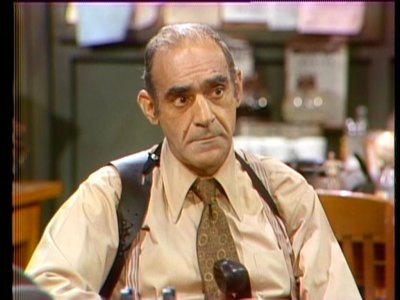
The DVD:
The Video:
Barney Miller was never a "good looking" show to begin with; shot on videotape, it has the typical grungy look of similar shows from the 70s (like Sanford and Son or All in the Family). But that look works here, and these full screen, 1:33 transfers are fairly sharp and crisp.
The Audio:
The Dolby Digital English track is in big, fat mono, which accurately represents the original broadcast presentation. Close-captioning is also available.
The Extras:
Included here are two "minisodes" of Charlie's Angels (Angels in Chains, a personal favorite), and The Facts of Life (Growing Pains). Too bad there isn't one interview with a former Barney Miller cast member, or a commentary track (let me know, Sony, if you need somebody in the future), for this gem of a show.
Final Thoughts:
Flat out one of the best network comedies of the 1970s, Barney Miller combined Neil Simon/Woody Allen-esque one-liners with an ensemble cast from heaven, creating an indelible portrait of that fictional "New York City" that we all came to simultaneously dread and laugh at, thirty years ago. Certainly one of the best-written shows of that decade, Barney Miller: The Complete Second Season is an absolute must-have for lovers of vintage TV - and it plays just as well today as it did then. I highly, highly recommend Barney Miller: The Complete Second Season.
Paul Mavis is an internationally published film and television historian, a member of the Online Film Critics Society, and the author of The Espionage Filmography.


|
| Popular Reviews |
| Sponsored Links |
|
|
| Sponsored Links |
|
|
| Release List | Reviews | Shop | Newsletter | Forum | DVD Giveaways | Blu-Ray | Advertise |
|
Copyright 2024 DVDTalk.com All Rights Reserved. Legal Info, Privacy Policy, Terms of Use,
Manage Preferences,
Your Privacy Choices | |||||||









